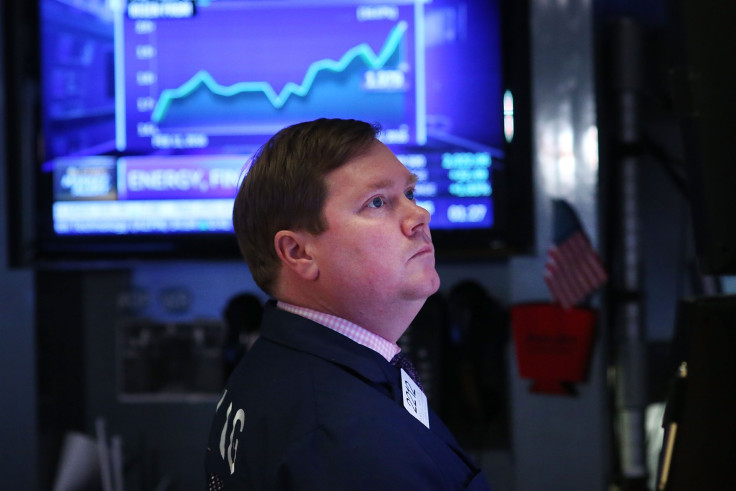Thursday's Stock Market Close: US Equities Plunge, Dow Falls 1,200, As Coronavirus Fears Intensify

KEY POINTS
- California Gov. Gavin Newsom said the state is monitoring 8,400 patients for virus
- Dow dropped 12.8% from recent high
- The 10-year Treasury yield fell to all-time low
U.S. stocks plummeted again on Thursday in wild trading as investors’ worry mount over the coronavirus outbreak that showed no signs of abating.
The Dow Jones Industrial Average plunged 1,190.95 points to 25,766.64 while the S&P 500 tumbled 137.63 points to 2,978.76 and the Nasdaq Composite Index dropped 414.29 points to 8,566.48.
The Dow has now dropped 12.8% from recent record highs set on Feb. 12.
Volume on the New York Stock Exchange totaled 5.96 billion shares with 388 issues advancing, 20 setting new highs, and 2,674 declining, with 690 setting new lows.
Active movers were led by Advanced Micro Devices Inc. (AMD), Ford Motor Co. (F) and Bank of America Corp. (BAC),
The U.S. Centers for Disease Control and Prevention reported the first coronavirus case of “unknown origin” in Solano County in northern California, suggesting the disease may be spreading. The CDC could not determine how the patient contracted the virus. “It’s possible this could be an instance of community spread of COVID-19, which would be the first time this has happened in the United States,” CDC said.
On Thursday, California Gov. Gavin Newsom said the state is monitoring 8,400 patients for signs of the virus.
Although Brazil has thus far reported only one case of the coronavirus, the country’s benchmark Bovespa index has dropped about 8.9% over the past two trading days.
“We’ve hit a pocket of fear,” said Gregory Faranello, head of U.S. rates trading at AmeriVet Securities. “This is a big deal. If this [fear of virus] flows into the U.S., we could be in trouble because, let’s face it, the U.S. consumer is what’s holding this thing together.”
More than 80,000 people around the world have contracted the virus, but mostly in China. South Korea reported more than 1,200 cases, while Italy said 400 people have contracted the virus. Saudi Arabia has temporary banned Muslim pilgrims from entering the kingdom.
“The fact that, not only, is there no sign yet of the pathogen being contained, but rather we now also face the specter of it spreading through the U.S., will continue to weigh on the global macro outlook for the coming months,” said Simon Ballard, chief economist at First Abu Dhabi Bank. “Buckle up for continued high volatility and escalating risk aversion.”
Economist Zhang Anyuan warned that China might see zero or negative growth in its gross domestic product in the first quarter.
“U.S. companies will generate no earnings growth in 2020,” warned David Kostin, Goldman Sachs’ chief U.S. equity strategist. “Our reduced profit forecasts reflect the severe decline in Chinese economic activity in [the first quarter], lower end-demand for U.S. exporters, disruption to the supply chain for many U.S. firms, a slowdown in U.S. economic activity, and elevated business uncertainty.”
Tom Hainlin, global investment strategist at Ascent Private Capital Management, fretted that “no one really seems to be an expert on the coronavirus. We haven’t seen anything like this really in our investing lifetimes.”
“As this week’s selling has progressed, we have seen some evidence of increased caution on the part of investors,” said Willie Delwiche, investment strategist at Baird. “Investors are shifting away from excessive optimism but there is still little evidence of fear overwhelming complacency.”
In U.S. economic news, the Commerce Department said Thursday that durable goods orders slipped by 0.2% in January after rising 2.9% in December. Excluding the volatile transportation sector, orders rose by 0.9% in January, the fastest pace since April 2018.
The National Association of Realtors said pending home sales in January rose 5.2%, well above expectations.
The Labor Department said initial jobless claims edged up by 8,000 to a one-month high of 219,000 for the week ended Feb. 22.
The Commerce Department also reported that a second revision of fourth quarter gross domestic product kept the rate unchanged at 2.1%, although the growth rate of consumer spending was downwardly revised to an 1.7% increase from 1.8%.
Chicago Federal Reserve President Charles Evans said Thursday the central bank might need to let inflation exceed its 2% target in the future in order to ensure pricing pressures aren’t too weak and monetary policy doesn’t fall to near zero rates.
Overnight in Asia, markets finished mixed. China’s Shanghai Composite edged 0.11%, while Hong Kong’s Hang Seng gained 0.31%, and Japan’s Nikkei-225 fell 2.13%.
In Europe markets finished broadly lower as Britain’s FTSE-100 plunged 3.49%, France’s CAC-40 plummeted 3.32% and Germany’s DAX dropped 3.19%.
Crude oil futures plunged 3.78% at $46.89 per barrel and Brent crude fell 0.33% at $51.56. Gold futures slipped 0.23%.
The euro rose 1.03% at $1.0995 while the pound sterling slipped 0.08% at $1.289.
The yield on the 10-year Treasury dropped 0.84% to 1.299% while yield on the 30-year Treasury fell 0.67% to 1.784%.
© Copyright IBTimes 2024. All rights reserved.




















